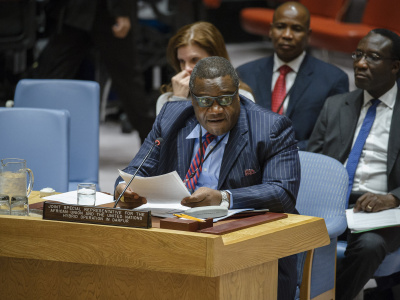
The African Union at twenty: A new leader in digital innovation?
In 2022, the African Union turns 20 amidst a shifting global geopolitical context. Energy security, strategic (economic) autonomy and one's standing in global multilateral systems, but also innovation and digitalisation, have increasingly become indispensable yet contested currencies. However, the AU’s new inward-looking digital strategy sees digitalisation as an economic issue and overlooks the fact that it can determine Africa's place in the world.
The AU will need to punch above its weight and help African states define a common vision for data governance and regulation, to become an active participant in global governance and a leader in digital innovation. That includes a strategy on how to regulate foreign tech companies operating on the continent and a policy framework for homegrown digital innovation.
The AU is catching up with changes introduced by digitalisation
When the AU was established in 2002, internet penetration in Africa was negligible. Even by 2007, only 5% of the African population was online (compared to 40% in Europe), and only one out of four Africans had a mobile phone. Nearly two decades later, internet penetration in Africa has improved, reaching an average of 39.6% in 2019 – even if the digital divide between and across countries is significant, ranging from 89.8% in Kenya to 5.3% in Burundi.
With a tenfold increase in internet users over the past decade, increasing accessibility of smartphones and digital services that are adapted to low internet speed, semi-digital phones and different national languages, Africa’s digital economy has been expanding fast.
In 2021, Africa accounted for 70% of the world's $1 trillion mobile money value and estimates indicate that Africa’s digital economy has the potential to reach 5.2% of the continent’s GDP by 2025. Countries such as Nigeria, Ethiopia, the Democratic Republic of the Congo, Tanzania and Kenya – which represent some of the most populous countries in Africa – are emerging as the continent’s most promising digital markets thanks to the adoption of mobile payment solutions.
Moreover, digitalisation is changing political governance and civic participation in many countries. The internet has allowed governments to offer some services online, and citizens to mobilise more efficiently and effectively.
In some contexts, such as Ethiopia and Sudan in 2018 and 2019, the use of social media allowed citizens to overcome some of the legal and political barriers imposed on civic participation and political mobilisation offline. The ease of accessing alternative sources of news and information sharing among people has also challenged governments' or public institutions' monopoly of information.
While this is positive, social media has also become a global platform for social polarisation, hate speech and violent mobilisation. It has even been used for political propaganda and manipulation by both state and non-state actors, including in election campaigns. Cambridge Analytica, the company that caused a huge scandal by influencing Brexit votes and US elections in 2016, was also implicated in Kenya’s 2013 and Nigeria’s 2015 elections – even if the legality of the company's role and the scale of its impact in the election outcomes in both countries are unclear.
The AU sees digitalisation principally as an economic matter
The growing recognition that digital technologies can drive innovation, inclusive and sustainable economic growth has inspired governments across Africa to develop their own digital strategies. For instance, Egypt already has its strategy for artificial intelligence (AI); Namibia is working to harmonise national policies into a national ICT policy and Rwanda is positioning itself as a tech hub for the continent by hosting the UNDP's $1 billion tech innovation hub called Timbuktu.
While more countries are developing digital strategies or explicitly linking digitalisation to their national development strategies, there are also countries like Eritrea or the Central African Republic which have not yet developed concrete approaches. While most national digital strategies emphasise the socio-economic advantages of digitalisation, each country presents different challenges and levels of digital development. This makes it difficult to align policies and articulate a continental agenda on digitalisation.
At the continental level, the AU has made some progress in developing the policy context around digitalisation over the past years. For example, the African Union’s Agenda 2063, a roadmap to Africa’s self-sufficiency and control over its own development journey, recognises the strong link between digitisation and the economy.
The AU aims to ensure that the infrastructure to support Africa’s economic integration, including developing ICT and the digital economy, is in place by 2063. The AU’s new Digital Transformation Strategy (2020-2030) is another stand-alone policy framework that aims to guide digital transformation in Africa, with a view to helping the continent build its Digital Single Market by 2030.
Yet, as things stand now, the AU's digital transformation strategy and other policy frameworks look at digitalisation as a tool for economic transformation, while missing its political and geopolitical implications. Africa is the last and largest untapped market, with a growing young population, as well as a consumer of digital infrastructure and technologies. Exactly for these reasons, it is attracting economic and political attention.
For example, much of Africa’s 3G and 4G networks are built with Chinese (private sector and state-led) technology and finances. Chinese manufacturer Transsion Holdings controls 40% of Africa’s smartphone market, which is the main medium for accessing the internet for millions of Africans, while 70% of the continent’s 4G network is built by Huawei. These investments and low-cost services have facilitated the connectivity of millions of Africans – at the same time helping China expand its political influence on the continent.
In contrast, the EU is primarily interested in influencing the normative aspects of digital governance in Africa. But it is also increasing its visibility and capacity to compete in infrastructure investment with its Global Gateway strategy, which includes a €150 billion investment package for Africa that focuses on both hard and soft infrastructure. With this strategy, the EU intends to support homegrown connectivity infrastructure and counter China’s growing influence on the African continent.
In addition, Africa is reliant on foreign digital technology, including data centres hosted outside the continent. This comes with practical challenges such as slow connection speed and high costs of managing and exchanging data. But it also poses data protection risks. The realisation that without local data centres African states are giving up political, economic and digital sovereignty has led to a surge in data centres across the continent.
Since 2016, more than 100 data centres have been constructed, but these account for less than 1% globally. This trend is shifting, as pan-African and American tech networks such as Africa Data Centres and Teraco are starting to invest in developing data centres in South Africa. The country already has about 27 data centres, and it is the largest data centre market on the continent, followed by Kenya and Nigeria.
The location, governance and ownership of digital infrastructure are geostrategic issues, as those who own and regulate digital technologies have economic and political advantages. The dependence on foreign digital industries for digital infrastructure, services and data storage of digital governance renders African states vulnerable to the economic and political agendas of private tech companies or governments.
The Cambridge Analytica electoral scandal on voter manipulation in the Kenyan 2013 elections and the recent withdrawal of Netflix, Apple pay and other American and European digital services from Russia as a response to its war in Ukraine are just a few examples of how digital technologies and companies are becoming highly politicised. As the geopolitical competition deepens, this could become an important challenge for Africa, which depends on others for its digital infrastructure, ICT technology and digital products.
African governments are increasingly requesting data on their citizens from foreign tech companies such as Facebook, Twitter and Google, while countries like Nigeria announced plans to regulate Facebook, TikTok and other social media and have also called for local alternatives to these digital services.
Governments are also defining the terms under which international actors engage with the continent. For example, Rwanda and Ethiopia, who signed a memorandum of understanding with China, are trying to access the Chinese digital market in search of economic opportunities for their private sector. Similarly, after successful negotiations, the EU-AU summit declaration mentioned that the EU’s support in infrastructure would be aligned to the AU’s Programme for Infrastructure Development (PIDA).
However, the AU digital transformation strategy falls short of acknowledging the external or partnership dimensions of digitalisation, and it fails to adequately address the political and geopolitical aspects of digitalisation. Nonetheless, the plethora of new AU flagship initiatives, if strategically used, will allow African digital actors to boost technological innovation, which will in turn allow the continent to create added value and increase its economic competitiveness.
But to get there, the AU and its members need to deploy the necessary political leadership that will proactively work towards reducing the continent's digital dependence.
Articulating Africa’s geopolitical interests
Setting the tone on digital governance – in Africa or globally – is an important component of digital geopolitics. The AU will need to punch above its weight and help African states define a common vision for data governance and regulation, including on how to regulate foreign tech operating in the continent, while creating an enabling regulatory environment for local tech to emerge.
At the same time, the AU and its member states need to invest more in understanding the geostrategic interests of their partners, such as the US, China and the EU, to position their interests vis-à-vis the interests and comparative advantages of their partners.
The AU should take its 20th anniversary to reassess the meaning of pan-Africanism in the geopolitically-sensitive 21st century to ensure the continent can benefit from global digital developments while also contributing to them. Without developing homegrown digital services and owning some parts of the digital infrastructure being developed in the continent, African states are going to lose their digital sovereignty.
The views are those of the authors and not necessarily those of ECDPM.







